TURKISH POWERSHIPS — PART ONE
Despite Eskom approvals, Turkish powerships still need Transnet buy-in for 20-year harbour moorings
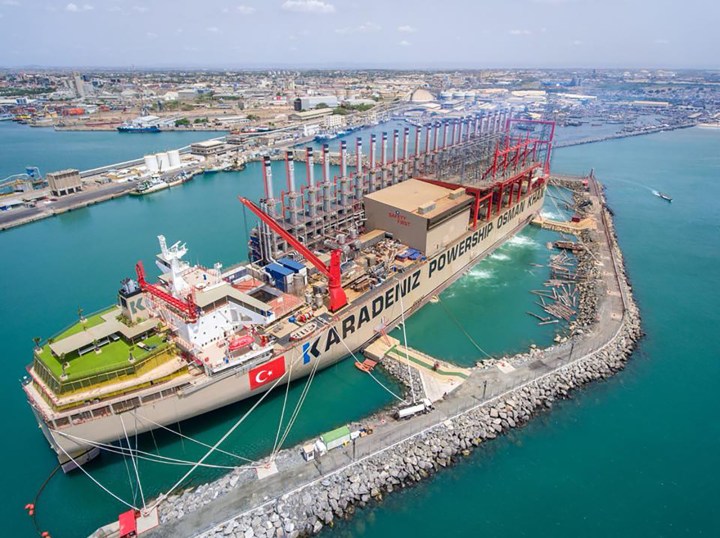
Transnet has confirmed officially that it has neither granted written permission to the Turkish-based power project – nor had it received a formal application when the list of preferred power supply bidders was announced last week by Gwede Mantashe, the minister of mineral resources and energy.
The announcement that Turkey’s Karpowership group has scooped pole position on the starting grid to provide emergency electricity to Eskom continues to raise questions, especially now that an eye-watering price estimate of more than R200-billion has emerged.
So far, Karpowership and its local empowerment partners have jumped over, ducked or side-stepped several regulatory hurdles in the race to despatch a fleet of gas-burning “powerships” to South Africa.
But it has yet to secure one of the most important approvals – written permission from Transnet to occupy constrained harbour space in three of the country’s busiest harbours for the next 20 years.
To generate up to 1,220 megawatts of electricity, the company plans to park eight ships for two decades in the ports of Richards Bay, Ngqura and Saldanha Bay.
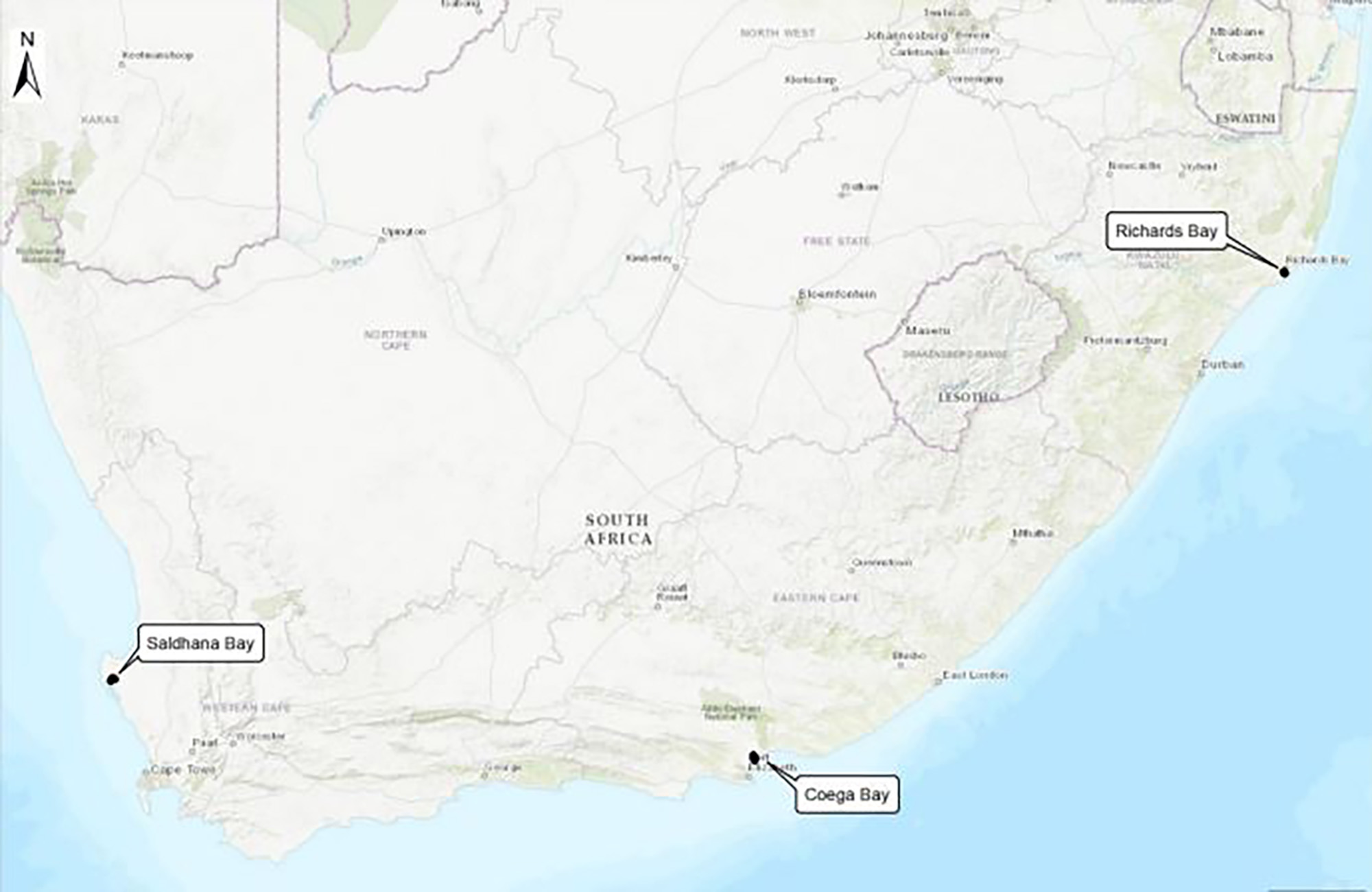
A locator map of the three proposed powership sites. (Map: Supplied by Karpowership)
Richards Bay is the largest harbour in the country when measured by overall shipping tonnage, while space is also tight at Ngqura and Saldanha.
Five of the Turkish vessels are floating “powerships” (specially modified craft that can burn gas or heavy fuel oil to generate electricity). The other three vessels, known as floating storage regasification units (FSRUs), convert imported supplies of liquid gas into a gaseous form to burn in the powership generators and turbines.
During the current environmental impact assessment (EIA) process, Karpowership executives have given assurances that they are negotiating with Transnet to secure permission to occupy constrained harbour space, and that specialist studies indicate that the presence of its eight vessels, submarine gas pipelines and land-based transmission equipment will not constrain current harbour traffic operations or unduly impede future expansion plans.
In three draft EIA reports published last month, Karpowership consultants acknowledge that there is currently no space available in the three ports to moor the eight Karpowership vessels on a semi-permanent basis, so they would have to be positioned in “unused areas” of the ports.
Proposed mooring sites had therefore been chosen to allow for the safe passing of other shipping traffic and also to maintain a 250-metre safety exclusion zone for potential gas fires, explosions and flammable gas clouds during regular ship-to-ship transfers of liquid petroleum gas.
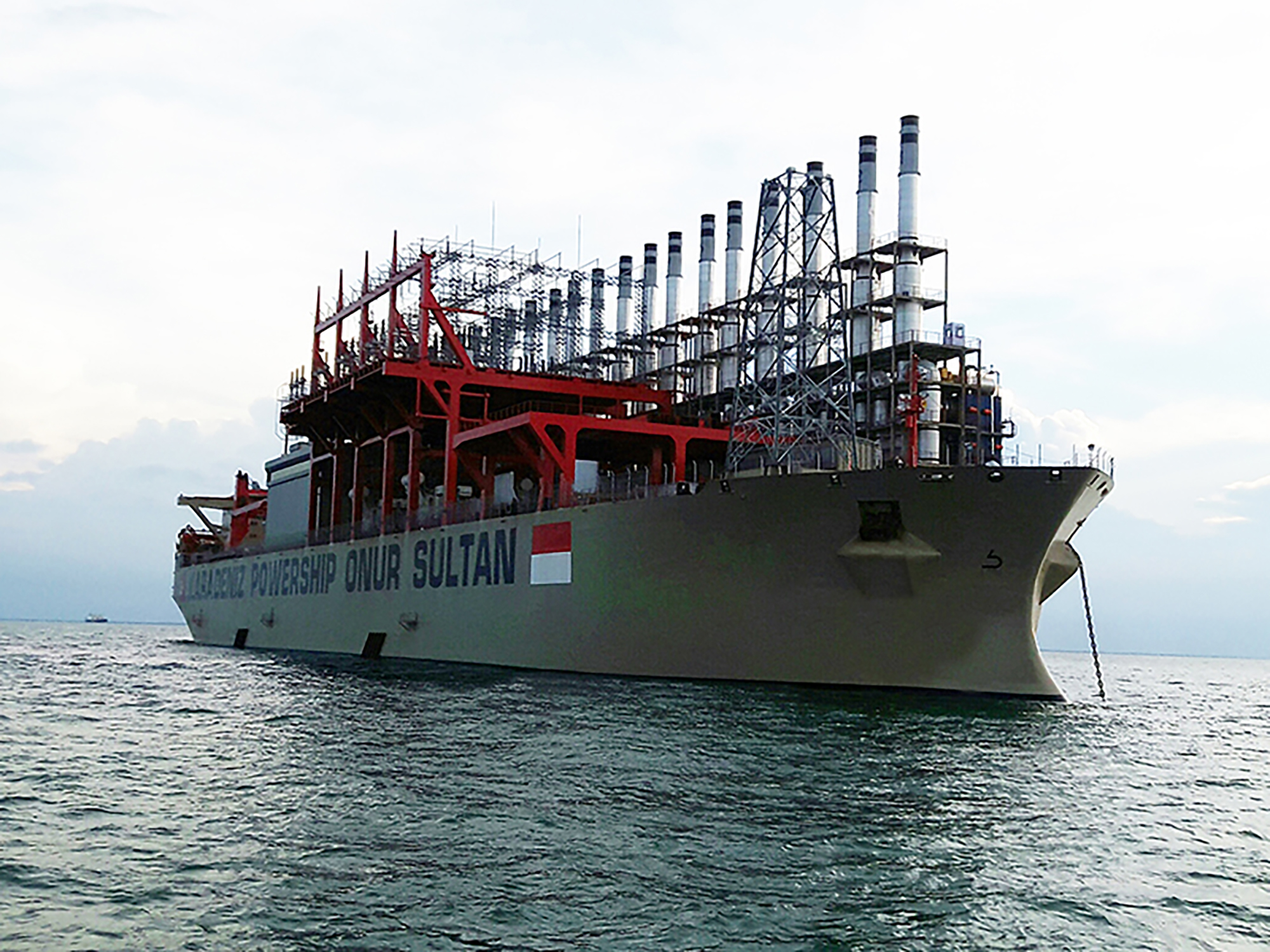
Floating powerships designed and developed by Turkey’s Karadeniz group have been deployed to several nations in the Middle East, Africa and Indonesia to provide a quick ‘plug-in’ solution to electricity crises. But a senior CSIR engineer suggests that this option comes with a hefty price tag for South Africa if the ships stay here for 20 years. (Photo: Supplied by Karpowership)
However, despite Karpowership’s public assurances that it is in discussions with Transnet, it remains unclear to what extent the full implications of the powership proposal have been workshopped and discussed formally with other harbour users, developers and planners.
In response to queries from Daily Maverick, Transnet has confirmed officially that it has not granted written permission to the Turkish-based power project – nor had it received a formal application when the list of preferred power-supply bidders was announced last week by Gwede Mantashe, the minister of mineral resources and energy.
“Transnet National Ports Authority (TNPA) has noted the announcement of the preferred bidders … The bidders have been selected on condition that they get all the required approvals, including environmental authorisations, and that they meet the port authority requirements in terms of the National Ports Act. No formal request has been received and no consent has been granted at this point by the TNPA,” Transnet said in response to questions.
The emergency power procurement project has also been designated as a Strategic Infrastructure Project (SIP) by the Presidential Infrastructure Coordinating Commission. This special designation allows such projects to be “expeditiously implemented”, but Transnet is also bound by both the National Ports Act and the Public Finance Management Act, which impose further obligations and conditions relating to the alienation, letting or disposal of state assets.
In terms of the National Ports Act, Transnet can enter into operational agreements with third parties under section 56 of the Act; a lease agreement under section 66 – or it can apply for a special exemption in terms of section 57.
However, the section 56 licence agreements can only be signed after “a procedure that is fair, equitable, transparent, competitive and cost-effective”. They are also subject to annual review and prior notification of affected parties via an advert in the Government Gazette.
As no formal application has been submitted or published for public comment yet, it is not clear which of these routes Karpowership will follow, but if it applies for an exemption under section 57, Transnet is obliged to specify the duration of the exemption and can also impose additional conditions. Under section 69, Transnet is further obliged to “ensure that a fair and reasonable balance is achieved between the protection of the environment and the establishment, development and maintenance of ports”.
It is noteworthy that Karpowership has already obtained an exemption from local content requirements and an exemption for a coastal waters discharge permit – but it stumbled last year while trying to secure another exemption from the mandatory EIA process using the pretext of the Covid-19 crisis.
Now it is compelled to navigate through a formal EIA process and Transnet approvals — a regulatory course that may not be plain sailing.
The fact that Karpowership has scooped the lion’s share of the emergency power bids on offer, coupled with the irregular granting of an EIA exemption (subsequently revoked by Environment Minister Barbara Creecy following public pressure) has rung several alarm bells.
The Green Connection, a local climate change and renewable energy lobby group, voiced concern last week that “something does not smell right” with the preferred bidder approval process and has asked its legal team to investigate the situation further and to request Mantashe to provide substantiated reasons for the decision to grant preferred bidder status to Karpowership.
Green Connection head Liziwe McDaid, who played a key role in derailing the government’s secret R1-trillion nuclear deal four years ago, said: “As the climate crisis intensifies, South Africa should be embarking on an energy transition to non-greenhouse gas emitting renewable energy sources. How do the Karpowership projects make the grade in this context since it will lock South Africa into fossil fuels for another 20-odd years?”
She said corruption and mismanagement at Eskom had forced the country into a dangerous corner, with steep power tariff hikes and load shedding.
“However, when exemptions like these occur with no rational reason, it creates an environment lacking in transparency and lends itself to suspicion. Should we, in our desperation, just accept any form of power generation, irrespective of its potentially harmful impacts or long-term cost implications?”
At a time when the general public and business are fed up with load shedding and unresolved Eskom power constraints, the floating powership proposal has generated some excitement and a sense that it offers a potentially miracle solution to South’s Africa’s power crisis.
Yet questions that still need to be answered relate to long-term costs due to electricity tariff structures, dollar-based fuel costs, tax breaks, gas explosion risks, climate change policy and degradation of the environment — and who stands to benefit most from the proposed multibillion contract.
Last week, for example, a senior Council for Scientific and Industrial Research (CSIR) engineer suggested that the powerships option is likely to cost between R8-billion and R10.9-billion annually. That is R160-billion – R218-billion if the “emergency” project runs for the full 20 years.
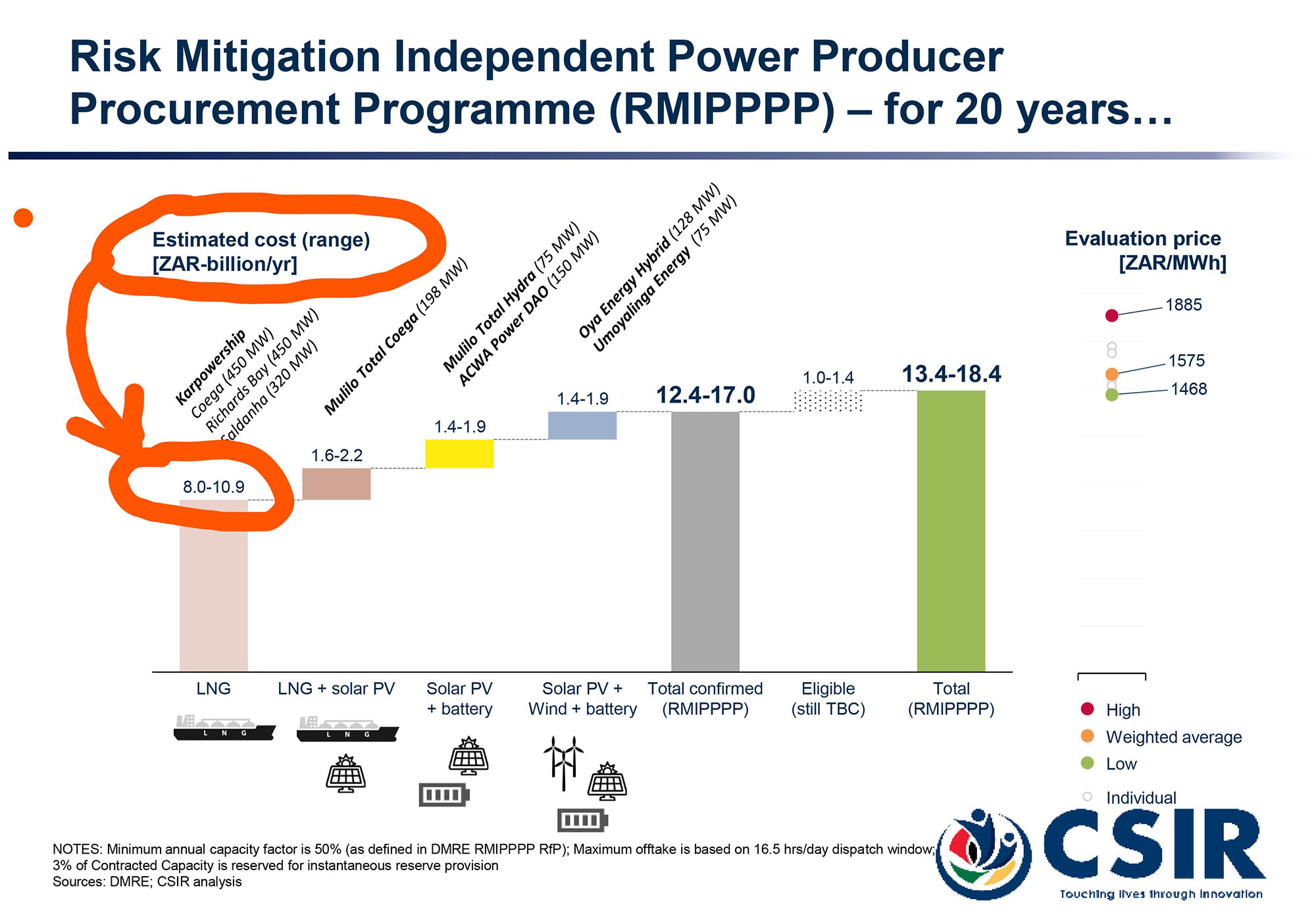
CSIR estimated cost ranges for several emergency power proposals suggest that the three Karpowership proposals (left) could come with a price tag of up to R10.9-billion a year. The estimates are based on current public domain information. (Source: CSIR)
Dr Jarrad Wright, a principal engineer at the CSIR, who presented this data to a City of Cape Town innovation forum on 26 March, said this estimate was based on available public-domain data, although the full terms of the proposed Power Purchase Agreement with the Turkish company had yet to be disclosed.
Karpowership did not dispute or confirm these numbers when Daily Maverick invited the company to comment on the accuracy of the Wright’s estimates, simply noting that:
“Our offer to rapidly deploy LNG to power solutions is cost-effective, reliable and will be up and running by August 2022. Karpowership SA produced bids at a lower cost than four of the other five successful bidders – with the Karpowership SA Coega project the second-cheapest of the eight bids.”
The company also declined an opportunity to be transparent in disclosing the names of directors and shareholders of its local subsidiary company, Karpowership SA (Pty) Ltd, and its empowerment and supply chain partners.
In response to an invitation to disclose this information, the company said:
“Current directors of Karpowership SA are as listed on CIPC (Companies and Intellectual Property Commission). Further, Karpowership SA has a broad and women-dominated BEE ownership structure. Mr Tiego Moseneke is the chairman-elect for Karpowership SA, subject to compliance with regulatory requirements.”
Daily Maverick is investigating the structure of the company further, though preliminary searches suggest that its local subsidiary and directors are potentially linked to a complex sub-structure of companies that include Powership SA, Powership SA Investments, Gas Intergration SA (spelling in CIPC searches), Veraworx, Karpowership SA Fuel Services, Karpowership Fuel Services, Karpowership Operation and Maintenance Company, and three separate Karpowership “project companies”.
Further questions have arisen around the economic wisdom of tying Eskom into a 20-year contract with a company that has traditionally profited from despatching emergency powerships to developing nations battered by war and planning policy failures (notable examples include Iraq, Cuba, Lebanon, Sierra Leone, Mozambique and Sudan).
One industry source close to the bidding process suggests: “We are now condemned to purchase power and fuel from a foreign source for 20 years in a project that is likely to lead to a constant capital outflow.”
The Presidential Economic Advisory Council also cautioned that the powership option was likely to be expensive.
The council, chaired by former SA Reserve Bank deputy governor and World Bank executive director Dr Renosi Mokate, said in a briefing note last October that the government seemed to have spurned opportunities to bring several renewable energy projects online that had short lead times or had already been developed and permitted.
The note further said there was a widely held view in the industry that the emergency risk mitigation project was extremely complicated and “specially written for more expensive powerships and gas-to-power projects” to exclude competition from renewables projects.
This analysis seems to have been proved at least partly correct, as the overwhelming share of the preferred bids announced by Mantashe turned out to be those from Karpowership and other gas-related projects.
Further questions have arisen on safety issues associated with mooring eight large gas vessels in three major harbours.
A hazardous safety assessment conducted as part of the EIA process suggests that in Richards Bay, no one in the harbour would be exposed to greater than a one-in-a-million risk of death or severe injury from gas-related fires and explosions, including supersonic vapour cloud explosions or boiling liquid expanding vapour explosions (BLEVEs).
But the modelling results also suggest that vapour cloud explosion risks could extend for up to 600m to affect other vessels and harbour staff at adjacent bulk cargo quays. (See Richards Bay fire and explosion risk map and caption explaining the colour contours.)

This risk assessment map for potentially devastating fires and explosions in Richards Bay harbour shows one of the modelling results for a vapour cloud explosion in the event of a gas leak during refuelling of Karpowership’s supply vessels. According to the risk assessment, the flammable cloud contour is shown in blue, a 10kPa overpressure contour in red and a more risky 30kPa overpressure contour in yellow. (Source: Major Hazard Risk Consultants)
Notably, the risk assessment for Richards Bay has specifically excluded the possibility of the power or gas supply ships being struck accidentally by other traffic and also appears not to have modelled the possibility of the gas ships being shifted closer together in a different harbour location, potentially magnifying the explosion risks.
The Department of Mineral Resources and Energy did not respond to requests for comment on the projected costs of the powership proposal. DM
Karpowership reply in full:
A spokesperson for the powership group said:
“Karpowership SA is proud to have been selected as a preferred bidder in the South African government’s Risk mitigation IPP Procurement Programme.
“We look forward to supporting South Africa’s economic recovery and helping end the current electricity challenges. Our offer to rapidly deploy LNG to Power solutions is cost-effective, reliable and will be up and running by August 2022.
“Karpowership SA produced bids at a lower cost than four of the other five successful bidders – with the Karpowership SA Coega project the second cheapest of the eight bids. The cost includes LNG which will be procured from Shell on a long term, exclusive deal to ensure that the projects have access to very competitively priced fuel through the lifetime of our partnership, ultimately to the benefit of South Africa.
“Karpowership SA will invest directly in the local economy, hiring for our operations and basing our supply chains in the ports that the Powerships will be based in. The value-add of Karpowership SA will not only comprise employment and skills development opportunities but will include procurement from local suppliers to provide goods and services to a new gas industry. Ultimately, these local suppliers and their supply chain will grow and expand, thereby creating a significant economic benefit to the entire country.”
In response to a request to disclose the names of its South Africa directors and shareholders, it said:
“Current directors of Karpowership SA are as listed on CIPC. Further, Karpowership SA has a broad and women-dominated BEE ownership structure. Mr Tiego Moseneke is the Chairman-elect for Karpowership SA, subject to compliance with regulatory requirements. He also chairs the executive steering committee that Karpowership SA has constituted to coordinate the work of the local and international teams, who are working tirelessly to meet the deadlines prescribed for financial close.”











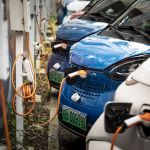









 Become an Insider
Become an Insider
Also not addressed are the grid connections. It may take some time for EIAs for power lines and substation extensions to be granted, as well as actually building them.
All three ports have massive transmission grid connections.
Richards Bay, especially people residing in Merensee, are suffering from coal dust from the harbour’s coal terminal for decades. Apart from dusty households, lung diseases are a major concern and shorten citizens’ lives. A proper transparent EIS is a must before gas ships can operate.
This is so dodgy. The ANC just can’t help themselves! Would love to see the names involved and their political connections. You have to admit they put a lot of effort into this one; from that company structure, this must have taken years to plan
Every time we have billions to be spent there is the smell of corruption. Where is the full bankable Feasibility Study where the engineering aspects can be peer reviewed and all costs will then be defined in detail. Especially noted is the comment that this solution is typical of developing nations battered by war and planning policy failures (notable examples include Iraq, Cuba, Lebanon, Sierra Leone, Mozambique and Sudan). Well done Gwede.
No mention is made about the routine maintenance of the ships. They must go to dry dock on a regular basis and other routine and safety maintenance must be done which could stop the generation of power for some time.
I smell a rat here. Somebody or some political party has a hand in the cooky jar!
20 Years is a long time in politics. Will a progressive new government with environmental sensibility agree with this approach?
No. Wind and Solar together with batteries will be cheaper, cleaner and faster to construct. Floating wind turbines are huge, +/- 12 mW each, and they can be operational very quickly. For a quick look at offshore wind check this site out .
For a look at offshore wind check this site out
Ooops – site does not allow other sites.
Yes , my thought too !
And no mention of the cost/kwh hour !
As they want Koeberg to run for another 20 years , same time frame !
Solar and wind not part of the plan , less avenues for corruption I guess 🙁
Why are we not bringing all the renewable power generators to to party first? Is this another race based issue. What are the Karpower kick backs and who benefits?
Could this be an April 1st joke? Surely there are other IPP solutions that would be more sustainable!
Can just imagine the Dept.MR&E conveing some artists & lawyers for a brainstorming session and skipped the idea evaluation phase …..
Got tempted by the Finger Lunch with Champagne??
Public opposition to this plan to exploit (steal from) the public coffers must be harnessed once again. There is absolutely no merit to this scheme at all and it is obviously another vehicle conceived to facilitate the enrichment of connected ANC cadres by impoverishment of the general populace.
This programme must be thoroughly investigated, it raises red flags regarding corruption. It will not promote the development of the local renewable power sector. Such a large dependence on gas is not environmentally sound. No exemptions from Environmental requirements should be permitted.
Thanks for investigating DM! How can we stop this nonsemse?
My goodness, having Gwede as a minister is a living nightmare. Is there not one single person in this entire government that has an intellect that works? Surely Tito must try and stop this utter nonsense but he just gets overridden.
We had the e tolls mess using Austrian counterparts with BEE partners which gave issues. Now we have a questionable technical solution and coupled with it a seemingly extended period of 20 years when I can only find suggested usage of a maximum of 10 years ( We surely should have permanent solutions by then). We have another hugely profitable BEE deal on the table ( I am sure the press will educate us shortly with the full trail of who is who’s brother) , we are not talking peanuts. Should there not be lessons learnt from the Zondo Commission on the table now to prevent another state capture. Shouldn’t independent engineers (ECSA) and financial institutes members be giving some audit on this process. Arms deal, PPE, tall trains et al.
I don’t prefer this, but I certainly prefer this to diesel peakers. Should be much cheaper and much cleaner. As a nation we need to stop fighting any improvement if it is not the perfect improvement.
I share your sentiment, but there are simply to many examples of massive national flops that we must make good. And it is not only flops; the politicians and snr gov officials are stealing us blind. Let there be proper checks and balances we can trust and we can start supporting growth initiatives.
Agree to all the above. Keep the Black Sea (Kara Deniz) people away from South Africa! We don’t need them. We have plenty of sunshine and wind to supply more electrical energy than our needs for the foreseeable future. Something definitely smells fishy here!
So a Mr Tiego Maseneke is Chairman-elect for Karpowership SA? A quick Google shows a lawyer (and the brother of then deputy Chief Justice Dikgang Maseneke) who was previously struck off the roll of attorneys in 2006. I wonder if it is thus the same Tiego now resurrected?
And I sincerely hope that Tony Carnie and the DM team investigate this further!